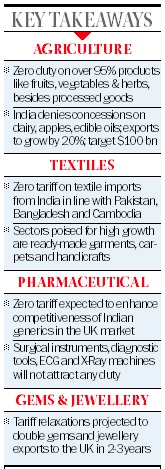India, UK ink landmark trade pact to boost economic ties
India and the UK on Thursday sealed a landmark free trade agreement (FTA) that will eliminate tariffs on 99 per cent of Indian exports, open new markets for British whisky and automobiles and create thousands of jobs in both nations.
Prime Minister Narendra Modi and his UK counterpart Keir Starmer attended the signing ceremony, hailing the pact as a transformative step toward enhancing trade, generating employment and stimulating economic growth.

The pact, officially called comprehensive economic and trade agreement (CETA), was finalised in May after three years of negotiations. It comes amid shifting global trade dynamics influenced by protectionist policies of US President Donald Trump.
Indian farmers stand to gain preferential access to the UK’s $37.5 billion agricultural market, with reduced tariffs on key exports such as basmati rice, millets, cotton, fruits, vegetables, spices, tea and coffee. Sectors sensitive for India like dairy, vegetables, apples, cooking oils and oats remain protected, while the UK’s $5.4 billion seafood market will open with duties dropping from 20 per cent to zero.
Commerce and Industry Minister Piyush Goyal and UK Business and Trade Secretary Jonathan Reynolds signed the deal, marking Britain’s most significant trade agreement since Brexit in 2020 and India’s largest strategic partnership to date.
Modi described the pact as “more than just an economic partnership; it is a blueprint for shared prosperity,” while Starmer emphasised its potential to deliver “huge benefits” by making trade cheaper, faster and more efficient.
Bilateral trade between the two nations currently stands at nearly $56 billion, with targets to double this figure by 2030. The CETA ensures duty-free access for 99 per cent of India’s exports to the UK, potentially unlocking $23 billion in new opportunities, said Goyal. Key sectors such as textiles, marine products, leather, footwear, gems, jewellery and engineering goods will benefit from zero tariffs, down from previous rates of 4 per cent to 16 per cent. The UK, in turn, gains from lower duties on clothing, footwear, tea, seafood and coffee.
The agreement also facilitates greater mobility for Indian professionals, including architects, engineers, chefs and IT specialists through streamlined visa processes. Additionally, it opens doors for Indian startups, MSMEs and service providers in IT, finance, law and education.
Notably, tariffs on Scotch whisky will plummet from 150 per cent to 75 per cent immediately, eventually reducing to 40 per cent over 10 years. India will also cut duties on UK cars from over 100 per cent to 10 per cent under a phased quota system, while Indian manufacturers will gain access to the UK’s electric and hybrid vehicle market, also under a quota system.
The deal further benefits the aerospace sector, with India eliminating import duties on components, a move expected to support major contracts with firms like Airbus and Rolls-Royce. With the UK already importing £11 billion worth of Indian goods annually, the liberalised tariffs are poised to make Indian products more affordable for British consumers while boosting export opportunities for Indian businesses, it said in a statement before signing the agreement.
India